It has been several years since I saw pianist Zhenni Li perform. Back then she partnered with violist Matthew Cohen. In New York on April 23rd 2022 she did so again, this time as Zhenni Li-Cohen.
The evening’s concert was a hybrid. In the first half the duo played together, with Ms. Li-Cohen providing piano support for Mr. Cohen’s viola. In the second half, Ms. Li-Cohen went solo.
Viola and Piano
The viola repertoire by Clarke, Tchaikovsky and Brahms encompassed the latter decades of the Romantic period. Played in reverse chronological order, we went from the early 20th century to the heart of the 19th.
I found myself mesmerized by these works. There was a period feel that transcended differences between the composers. At times it felt as if one composer could have written them all.
Was this simply a well-chosen late romantic program, or a perfect musical collaboration? Perhaps it was the grace of Mr. Cohen’s viola, or the distinctive color of the accompaniment? However you explain it, the whole felt larger than the sum of the parts.
Rebecca Clarke: Morpheus
Rebecca Clarke was an English composer. Morpheus opens with a distinctly English viola melody over a subdued accompaniment laced with soft glissandos. Think of Ralph Vaughan Williams with an impressionist overlay.
Mr. Cohen’s ethereal execution was ably supported by Zhenni’s atypically low-key accompaniment. My thanks to these musicians for introducing us to this delightful gem.
Tchaikovsky: paraphrase on Eugene Onegin
In musical terms, a paraphrase falls somewhere between an arrangement and a rework. What we heard was not what Tchaikovsky wrote, and yet it was Tchaikovsky. I am uncertain who arranged it.
Brahms: Sonata No. 1 in E minor for cello and piano
Arranged for viola and piano by Mr. Cohen, this was a pleasant and mellow experience. For me, it was overshadowed by the previous works. Programmatically, it was a well-chosen lead-in to the Bach/Busoni that followed.
Piano Solo
In the first half of this concert, Ms. Li-Cohen’s role was that of a supporting pianist. In the second half, freed of the confines of collaboration, we experienced her at her most vivid. I will focus primarily on her Bach/Busoni, the peak of the evening.
Bach/Busoni Chaconne in D minor
Ferruccio Busoni‘s arrangement of Bach’s violin partita is a colossal masterwork. I personally prefer more restrained interpretations to those that are overtly virtuoso. And indeed, Zhenni’s opening was well-paced and satisfyingly stately.
Later there were a couple of glitches, but she fought through and stayed in command. Toward the finish some fast passages were hurried, arguably appropriate to such a passionate delivery.
Overall I greatly enjoyed Ms. Li-Cohen’s performance, which I perceived to have an unusually romantic spin. Partly this was because she used a lot of pedal. But later when reviewing the audio, I found that my perception had also been colored by the pianist’s highly expressive body language.
One rarely sees this arrangement played with so much visual bravura. Look at the example in my photograph of Zhenni at the piano. At first this seemed sacrilegious. I mean this was BACH, so why was the pianist throwing herself around like a rag doll? But in fact the best pianists use every tool at their disposal, and that’s exactly what she was doing.
Debussy: Preludes 1-5, Book 1
These Debussy preludes felt like a Monet painting. I loved how Ms. Li-Cohen managed the balance between low and high registers to create depth and serenity. Of everything Zhenni played for us, this was her most impressive accomplishment.
Stravinsky/Agosti: Danse Infernal du roi Kastchei (Firebird)
Informatively introduced by Ms. Li-Cohen, this was a short and entertaining conclusion. After Debussy, it felt like a pre-programmed encore.
Closing thoughts
Zhenni and Matthew overcame similar challenges from their sheet music “tech”. I was impressed to see Zhenni’s left hand keep playing while her right swiped repeatedly at a recalcitrant page on her tablet. And I was impressed to see Matthew kick his malfunctioning bluetooth pedal away and play perfectly without it.
From their well-designed program to their resilience under pressure, the Cohen viola and piano duo gave us a wonderful evening. We were privileged to spend time with these truly professional musicians.
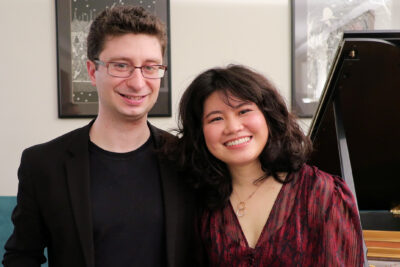
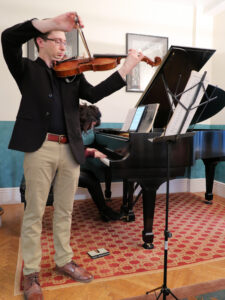
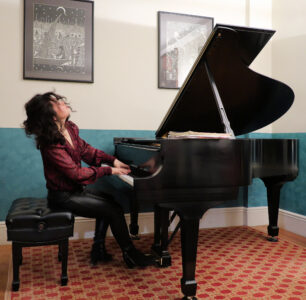
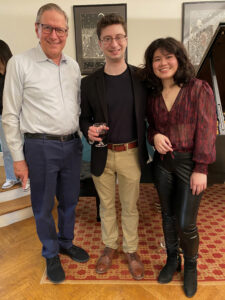
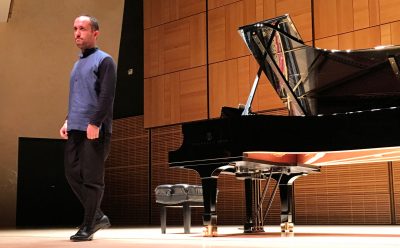
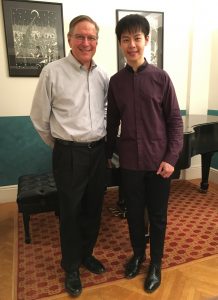
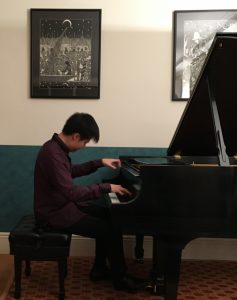
You must be logged in to post a comment.